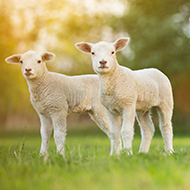Vets find link between lamb weight and meat quality

Lambs heavier at weaning were found to be the highest quality at market.
Lambs at their heaviest at the point of weaning go on to produce the leanest and most sought-after meat at market, according to new research.
The finding by Rothamsted and the University of Bristol Vet School could allow farmers to concentrate on giving their flock the best start in life, as well as breed lambs that are heavier once weaned.
Lead author and PhD student Andy Jones said that a greater understanding of how better-quality meat is produced would be beneficial to both human health and the livelihood of sheep farmers.
“More than a third of British lambs going to market are rated as overfat and we’ve shown that the leanness of lamb meat is determined very early in an animal’s life,” he said.
“Given that the majority of lambs’ pre-weaning nutrition comes in the form of ewe milk, it is now likely that carcass quality is also affected by management of ewes during pregnancy and lactation. On the other hand, how to manage lambs once weaned may not be as important as those early life experiences.”
In the study, researchers found that the leanness and musculature of lamb meat can both be successfully predicted from the growth pattern of the animal before weaning. Lambs heavier at weaning (around 13 weeks) were found to be the highest quality at market and therefore returned significantly greater profits.
Besides the benefits to consumer and farmers, researchers say the finding could also have implications for climate change. Study lead Dr Taro Takahashits, a senior lecturer in sustainable livestock systems and food security at Bristol Vet School, said:
“At first glance, livestock’s impacts on environment and health may seem independent from one another, but as we’ve demonstrated previously, the carbon footprint of a food item should be evaluated as the ratio between greenhouse gas emissions and the overall nutritional value of the product, rather than just the nominal weight of the product.
“Besides, if these lambs spend a shorter time on the farm, this can trim down emissions of both methane and nitrous oxide as well.”
The study, 'Using a lamb's early-life liveweight as a predictor of carcass quality’ is published in the journal Animal.



 The Veterinary Medicines Directorate (VMD) is inviting applications from veterinary students to attend a one-week extramural studies (EMS) placement in July 2026.
The Veterinary Medicines Directorate (VMD) is inviting applications from veterinary students to attend a one-week extramural studies (EMS) placement in July 2026.